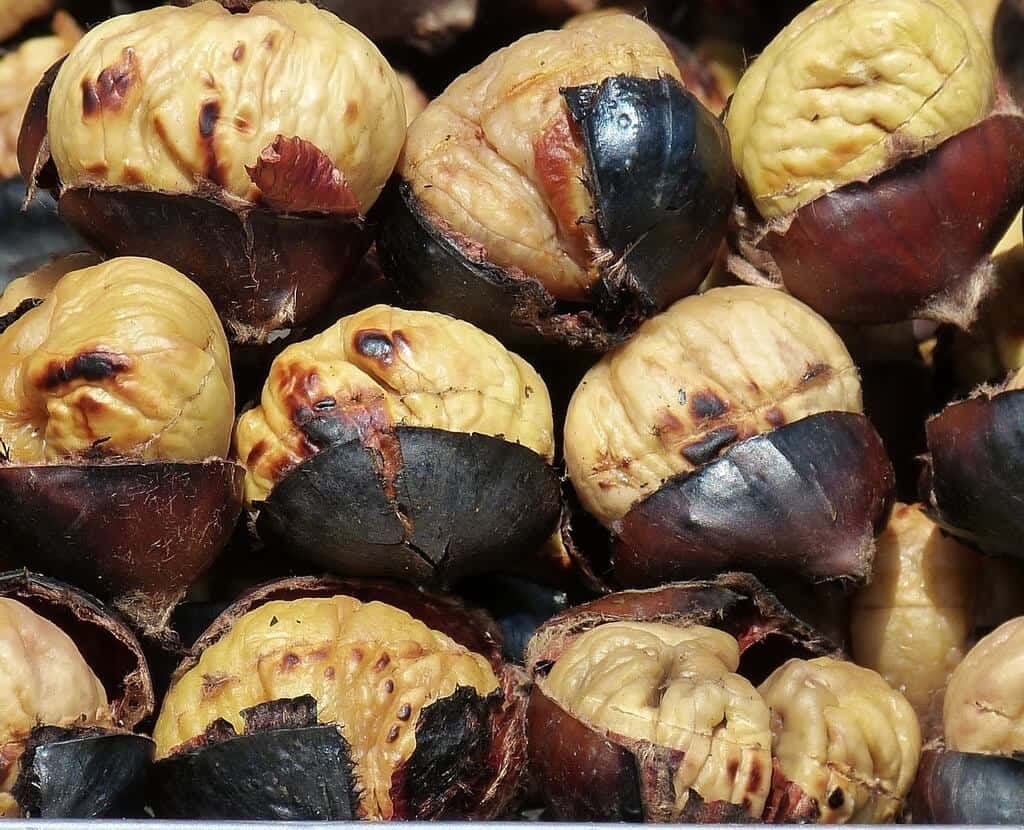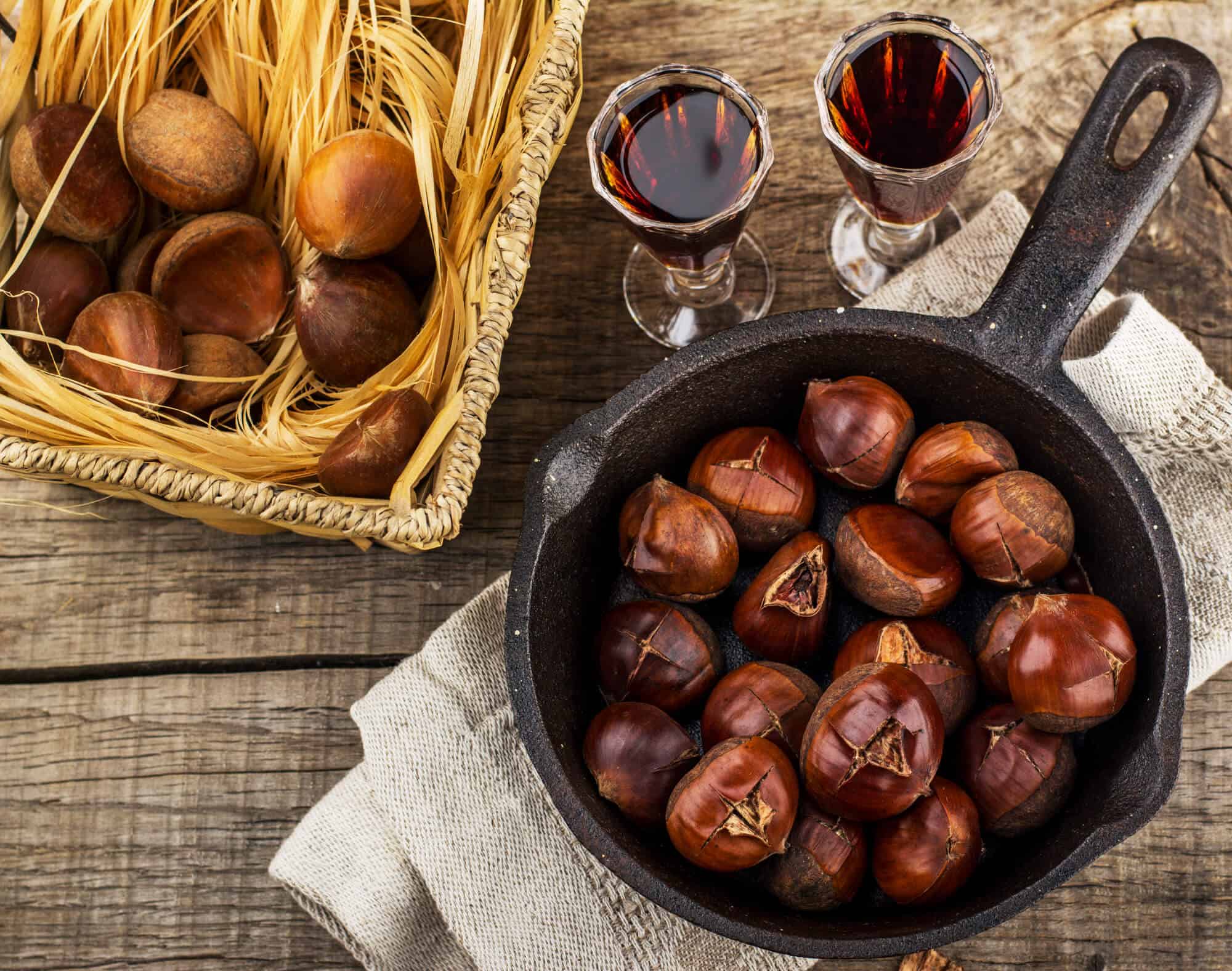Holiday season without the enchanting smell of roasted chestnuts can be difficult to imagine. Even the legendary Nat King Cole in his renowned carol – “The Christmas Song“ – sings about “chestnuts roasting on an open fire”. However, what many people fail to realize is how healthy and delicious chestnuts really are.
Contents
- 1 What are Chestnuts?
- 2 Chestnuts Health Benefits
- 2.1 Fiber for Improved Digestive Health and Managing Sugar Levels
- 2.2 Potassium for Regulating the Blood Pressure
- 2.3 Vitamin C for Strong Immune System, Blood vessels and Connective tissue
- 2.4 Rich in Manganese. Great for Oxidative Damage Prevention
- 2.5 Rich in Calcium, Copper and Magnesium for strong bones
- 3 Chestnuts and Pregnancy? Yes!
- 4 Conclusion: Chestnut Health Benefits
What are Chestnuts?
Chestnuts come from trees of Castanea genus. The most popular types of chestnut are:
- European (also known as “Sweet” or “Spanish” chestnut)
- American
- Chinese
- and Korean/Japanese chestnuts
There are slight differences in taste amongst these types – ranging from mild to sweet. However, the health benefits are almost exactly the same. Yet, we shouldn’t confuse these with horse chestnuts (“conkers”). Although it looks similar, horse chestnuts are not only inedible, but also toxic.
Since chestnuts have a rather mild taste with a touch of sweetness, they can be used both for sweet and salty dishes. That’s why these nuts are widely used in kitchens all over the world. The most common way of preparing this delicious, low-fat treat is by roasting it on an open fire, in an oven or in a microwave. However, Chestnuts can also be cooked in boiling water, grilled, steamed, candied, deep-fried, or ground into flour. Mashed chestnuts can be used to make a delicious and healthy dessert called Chestnut purée. A gem of French cuisine which every sweet tooth must try.

Chestnuts are in season from October to December, but also available in September and January. Out of season, chestnuts can be bought in a can, jar, precooked or vacuum-sealed. Preserved chestnuts still have valuable health benefits, and can usually be found in any well-supplied grocery store.

Measured against other nuts (such as macadamias, almonds and pine nuts), chestnuts are extremely low in fat, making them the only true low-fat nuts. Secondly, they’re rich in vitamins and minerals and it’s the only nuts that contain the essential Vitamin C (at a noteworthy level). Third, in comparison to other nuts, only hazelnuts have higher fiber content.
Chestnuts Health Benefits
Fiber for Improved Digestive Health and Managing Sugar Levels
Chestnuts are rich in fiber. Adequate fiber intake reduces the risk of developing chronic gastrointestinal diseases. A portion of 200g of chestnuts can provide over 30% of the recommended daily intake of fiber. Thus aiding optimal gastrointestinal functioning.
Moreover, the fiber in chestnut can help reduce cholesterol, as well as stabilizing blood sugar levels. This makes it an ideal snack for those suffering from diabetes.
Lastly, a significant amount of zinc can be found in chestnuts, which can treat and calm the symptoms of stomach flu (gastroenteritis).
Potassium for Regulating the Blood Pressure
There aren’t many foods that provide as much potassium as chestnuts (Coconut water and bananas are two other high-potassium options). This essential mineral is great for controlling the blood pressure since it regulates the levels and flow of water throughout the body. Furthermore, it’s highly beneficial for your blood vessels and arteries. Potassium decreases the risk of heart attacks while boosting general cardiovascular health.
Vitamin C for Strong Immune System, Blood vessels and Connective tissue
We’ve already mentioned that chestnuts are the only nuts containing vitamin C. Everybody knows that vitamin C is great for boosting the immune system, but it doesn’t stop there. It also guards against the destructive and dangerous effects of free radicals in the body. Plus, it plays an important role in the formation of blood vessels, muscle tissue and collagen in general.
Rich in Manganese. Great for Oxidative Damage Prevention
Another mineral that can be found in significant amounts in chestnuts is manganese. Similar to Vitamin C, this mineral is also an antioxidant. That means that it protects our body from a number of chronic diseases caused by the disrupted balance between free radicals and antioxidants. Apart from Vitamin C and Manganese, chestnuts also contain tannic, phenolic and fatty acids, copper, zinc and Vitamin A, all of which have great antioxidant properties.
Additionally, manganese slows down the aging process and boosts blood clotting. The best thing is that a 100g serving of chestnuts will provide your body with more than 50% of the recommended daily intake of manganese.
Rich in Calcium, Copper and Magnesium for strong bones
Chestnuts are rather rich in vital minerals – calcium, copper and magnesium. You surely know that calcium is important for good bone health, but what you probably don’t know is that copper and magnesium are equally important. According to BetterBones.com (1), insufficient levels of copper are connected to the development of age-related bone disease called osteoporosis. We should also consider the fact that copper is usually one of the most deficient minerals in our diet. Luckily, a 100g serving of chestnuts provides more than 30% of the recommended daily intake of copper.
Apart from many other health benefits like fighting diabetes, relieving migraines, and lowering blood pressure, magnesium is very important to our bones. Combined with other minerals, magnesium strengthens your bones and boosts bone mineral density. Thus, including chestnuts in your regular diet can help you prevent many bone disorders and help your bones stay strong.
Chestnuts and Pregnancy? Yes!
If you’re not already eating chestnuts during pregnancy, you should start eating them right away! These “superfood” nuts are packed with folate (vitamin B9) – an essential nutrient especially important during pregnancy. It provides healthy development of the fetus, particularly the brain and nervous system. Folate is also vastly important for cell growth and DNA development.
Conclusion: Chestnut Health Benefits
Considering all the above health benefits of Chestnuts, you should definitively try to include it in your regular diet. It doesn’t matter if you prefer sweet or salty; roasted, boiled or puréed; as a snack or a dessert. It’s completely up to you, your taste and your cooking skills. One thing is certain though – your body will thank you for it!
How do you feel about Chestnuts and the health benefits? Have you ever tried it? Comment below with your own tips, observations and questions!
In Below Video I taste-test both delicious Portuguese Chestnuts as well as Brazilian Giant Pine-nuts.
Further Reading
https://www.nutrition-and-you.com/chestnuts.html
https://www.sharecare.com/health/health-value-of-foods/is-the-nutritional-value-chestnuts
https://healthyeating.sfgate.com/benefits-roasted-chestnuts-2283.html
https://www.organicfacts.net/health-benefits/seed-and-nut/chestnuts.html

